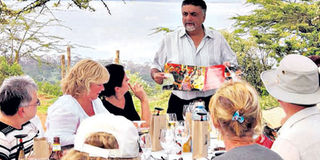Bespoke safaris see tour firm drive ahead of rivals

Twiga Tours CEO Minaz Manji (standing) with some of his guest tourists at a bush event. This tactic, he says, has endeared him to many of his customers. Photo | Correspondent
What you need to know:
- Started 35 years ago, Twiga Tours has been winning the hearts of its overseas’ stream of customers using tailor-made travel plans
Minaz Manji is three years shy of his 60th birthday of which over half of it has been spent in Kenya’s tourism industry.
For 35 years now, the accountant has successfully steered Twiga tours, a firm that he established at the age of 22 when the industry was dominated by multinational travel companies.
“We started in the 80s when tourism was a western concept and there were no local firms, which I knew of, in the business,” he notes.
It was a time when faxes and post offices were the most efficient modes of communication. Tourists usually relied on global tour firms to organise and manage their itinerary in Kenya and across the region.
“There was a huge gap in the local and regional tourism industry and I decided to take it up since it was my passion that I developed while travelling with my father across the region,” said Mr Minaz, whose father was a businessman.
While the sector was still young and unexploited, the 57-year-old says that he adopted a concept which he attributes to the success of the family-owned tour company.
Twiga Tours, says the chief executive, opted to offer its customers tailor made services in order to win their hearts.
“If, for instance, a family was coming to celebrate an anniversary, we would set the party right at the airport all the way to their intended visiting site. That model helped us win many customers,” he told Money.
As if the bespoke parties were not enough, Mr Minaz usually hosted his customers for dinner, in his house, in the course of their stay in Kenya.
Looking back, Mr Minaz says he does not regret having quit his job with an audit firm to set up Twiga Tours in a single room, in Westlands where he started with two staff.
The firm now employs about 150 people. Twiga Tours now has branches in Mombasa, and Arusha and a fleet of 60 vehicles.
“The fact that we were a local firm also gave us an edge over the multi-nationals in spite of their huge financial muscles and global connections,” he says when asked how he overcome competition from international firms.
So rapid was Twiga rise that in 1986, barely six years after establishment, it was recognised as the best tour firm by Belgium’s largest tour company, Jetair. That was the Twiga’s maiden award.
So far, Bid International Business Consultants have recognised Twiga tours with the International Star for Quality in 2004, 2005 and 2008 as Mr Minaz’s firm cemented its position in the tourism industry.
Today presents a completely different field; technological growth has facilitated easy and fast communication across the world. The industry has also attracted more investors, intensifying competition in the sector that is a key source of foreign exchange.
“Competition is very stiff nowadays and you have to be at your best to win and retain clients,” observed Mr Minaz. Twiga Tours has representatives in Kenya’s major source markets. This Mr Minaz says, has given them a competitive advantage.
“When we started, Kenya was the second most attractive tourist destination on the continent behind South Africa but other destinations have come up,” he says.
Like all other players in tourism sector, however, Twiga Tours has faced the wrath of insecurity that has hit the country.
“The past two years have actually hit the sector and it’s been very hard for players including ourselves because the perception out there is that we are not a safe destination,” notes the chief executive officer of Twiga Tours.
Earnings from the sector have fallen for three years in a row. In 2013, 1.09 million international visitors came to Kenya. It was an 11.3 per cent drop from 1.23 million who visited the previous year.
The country earned Sh93.45 billion from tourism in 2013, down from Sh94.34 billion in 2012, underlining the impact of insecurity that has been linked to Somali-based terror group, Al-Shabaab.





